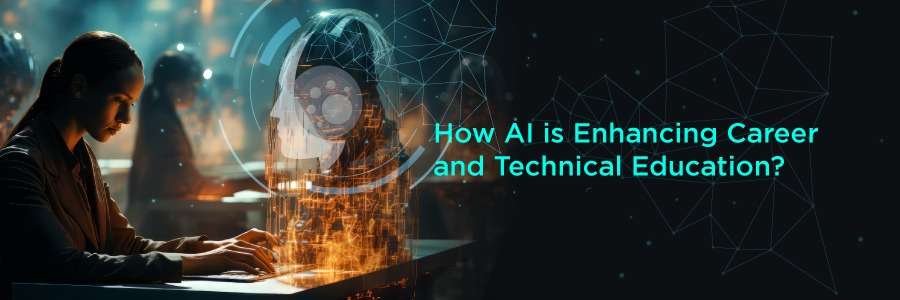
By: Creonow
How is AI Enhancing/Transforming Career and Technical Education? AI integration with different sectors has significantly changed how we work, learn, and handle machines. Career and Technical Education (CTE), which prepares students for the workforce, is undergoing a transformative shift driven by AI. AI continuously transforms CTE through improved curriculum delivery, personalising learning experiences, and preparing students for future job markets. AI doesn't just assist students in acquiring technical skills but also helps them transition from learners to professionals. In addition to ensuring children 's academic future, it also supports teachers and students, contributing to the holistic development of the education sector. These are some of the ways AI is influencing career and technical education. Personalized Learning with AI AI enables customized learning experiences, moving away from traditional "one-size-fits-all" approaches. People were sceptical of introducing AI for education up to the pandemic period. But now, more and more people are adopting this type of education due to the enhanced learning experiences it offers students. The AI system evaluate students' weaknesses and strengths to help the teachers design modules according to the student's capacity. In addition to this, artificial intelligence can judge students' performance and point out areas of improvement. It can recommend courses or modules to improve their knowledge. This way, AI helps students to learn by their capacity and pace and improves outcomes. Enhanced Teaching and Assessment: Imagine a teaching assistant who can help grade assignments, provide feedback, and suggest specialized courses for students. AI offers this kind of support to educators, automating routine tasks and allowing them to focus on engaging with students. It automates regular tasks, grades assignments, and gives feedback. How brilliant! Isn't it? It helps to develop better relationships with the students by improving engagement. AI-Driven Curriculum: AI helps educators understand which course is preferred by employers the most and create modules based on feedback. Knowledge of the latest labor-market trends will help students also choose a career that helps build a better career for them. Furthermore, AI can streamline administrative tasks, freeing up teachers to focus on guiding students and enhancing their learning journey. Simulation and Virtual Reality: Incorporating AI with Virtual Reality (VR) and Augmented Reality (AR) in CTE programs creates immersive learning environments. Such technologies foster immersive learning environments where students can practice their skills in safe, controlled environments. For instance, budding electricians may install virtual wiring systems while healthcare learners can engage in lifelike patient simulations. These experiences, driven by AI algorithms responding to student actions, give genuine practising experience toward acquiring practical knowledge, improve the learning experience, and boost confidence among learners. Career Guidance Powered by AI: AI plays a significant role in career counselling by matching students' skills and qualifications It helps students apply for jobs matching their skills, educational qualifications, and career aspirations. Furthermore, it helps job providers choose a candidate most appropriate for the jobs. AI-supported career counselling tools can guide students through the options available to choose their career paths. Continuous Learning Opportunities: Students and professionals should continuously learn to stay competitive in today's job market. To accomplish this, AI-powered CTE programs provide courses that offer training modules tailored to the market needs. It will help them remain competitive in their respective fields. Inter-Disciplinary Learning Opportunities: AI technologies often intersect with fields like data science, robotics, and cybersecurity. Technical education programs may use AI for the development of an interdisciplinary learning experience that promotes cooperation, creativity, and the exploration of state-of-the-art technology. This approach encourages students to explore cutting-edge technology and adapt to an ever-changing workforce. Collaboration Between Educational Institutions: Artificial intelligence offers an advanced framework through which academia and industry partners can benefit each other through internships, project work, and experiential learning opportunities for students. Exposure to hands-on AI applications and industry best practices assists students in getting ready for successful careers. Ethical and Social Implications/considerations: Technical education programs should cover the ethical, legal, and social ramifications of AI as it has become an indispensable part of our lives. There should be discussions centred on data privacy, responsible development, and applications of AI systems. We now know the impact of AI in enhancing career and technical education. Let us know a little about why it is risky to exclude students from AI education. • Since students may lack the knowledge and abilities to use AI-driven technologies, it may lead to a digital divide in society. • It will make it difficult for them to collect information and participate in many communities that contribute to development ultimately. Final Thoughts: AI is revolutionizing technical education by enhancing personalized learning, innovating teaching methods, aligning curricula with future job market needs, promoting interdisciplinary skills, and addressing ethical considerations. Technical education has to adopt AI to make sure students possess the required information, skills, and attitudes to do well in an increasingly AI-oriented world.